Interesting features of old laptops part 2
Continuing the article "Interesting features of old laptops."
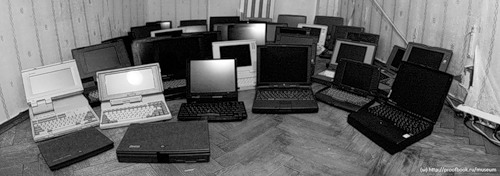
Next, tell about food.
Now about the interesting power button.
For the oldest laptops, it can be a regular switch, like the Toshiba T3200
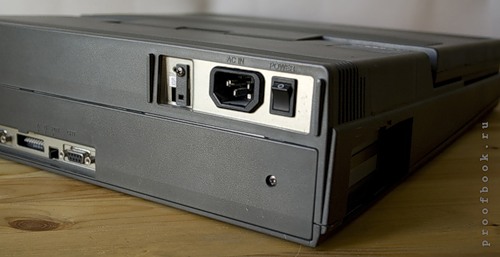
')
For others, this is the usual button, or as it used to be popular - the slider that needs to be moved. And there were also interesting.
For example, Ibm thinkpad 570 has a lock button (like on video cameras). Located on the side.
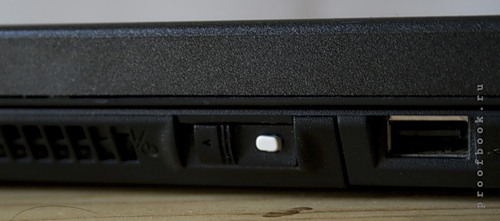
Until you click on the white file in the middle, the slider will not move.
The Toshiba satellite 330CDT has a slightly different lock: under the button there is a locker engine that blocks the button press - you will not turn it on accidentally.
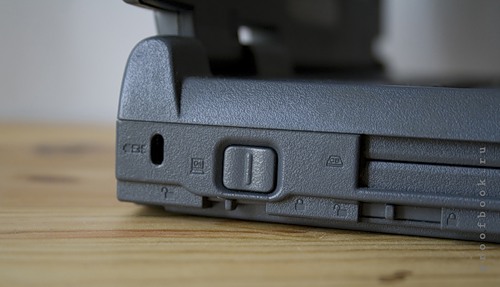
At the same satellite 330CDT Toshiba modem connector is interestingly implemented, which takes up very little space.
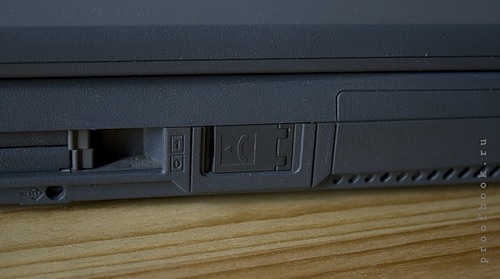
It is necessary to open the lid with a modem icon, as it turns into anelegant connector shorts .
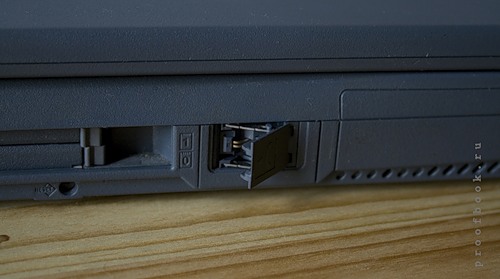
I can not say that Toshiba came up with this design - I do not know for sure, but the same connector on the Toshiba Portege 3110CT baby. Although I saw this implementation in Sonya (they are also great in terms of laptops).
The current laptops will not find the Reset button, and the old ones still had such a function.
The Apple powerbook 3400c it is located behind the cover (something I forgot to take a picture of it).
In Ibm thinkpad 770, it is recessed into the case and is located next to the power button (you can click in pencil)
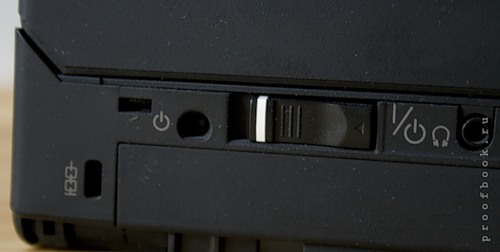
At Toshiba satellite 330 "hole" reset right on the front end of the laptop
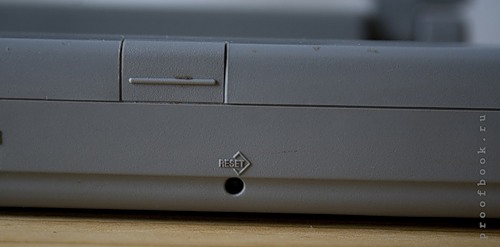
I almost forgot to show the power button on this Toshiba: it is located under a small sliding cover.
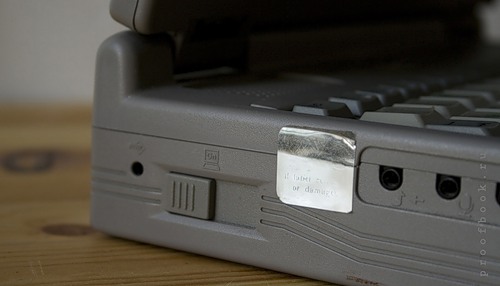
I moved the cover - pressed the button. Again a little protection against accidental activation.
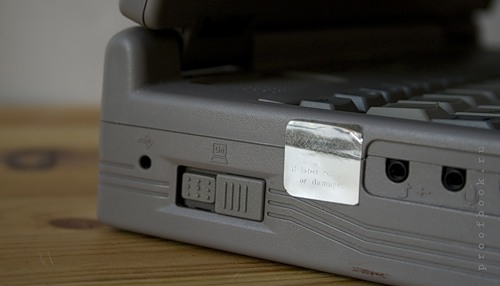
About the convenience of storing and carrying charges from the laptop, Apple has thought for a long time.
The power unit from Apple powerbook 3400c already had folding ears for winding wires.
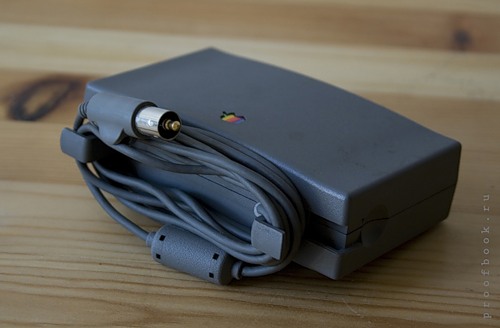
A "clothespin" to secure the wire located directly on the connector body
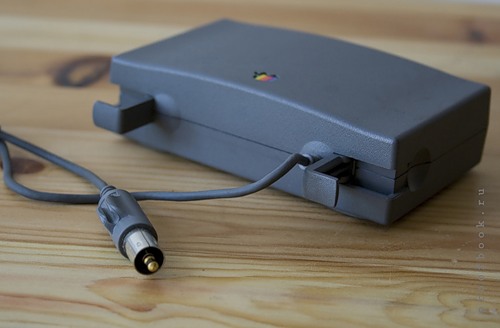
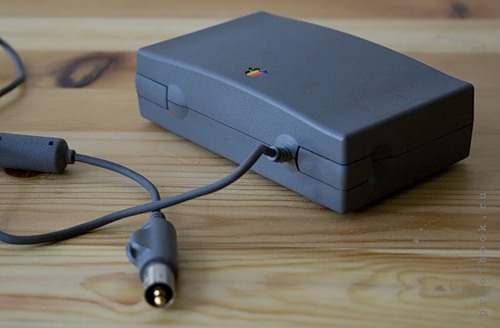
But not all laptops had an external power supply. As I mentioned above, the 8.5-kilogram Toshiba T3200 power supply is integrated.
Built-in power supplies can be found in some Compaqs, such as the Compaq Armada 1700
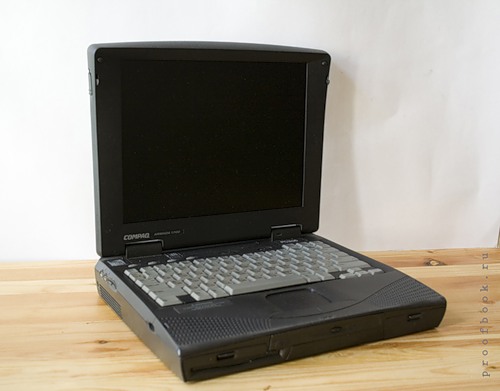
Just stick the power cord into the laptop and work.
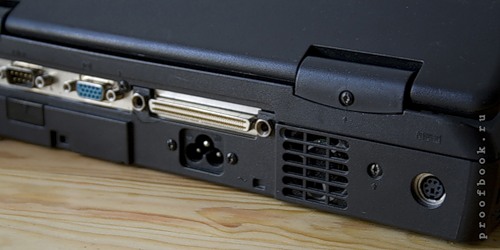
The younger model, Compaq Armada 1500, could also have a built-in power supply, but it could be seen to be unprofitable, or there were other reasons, and the power supply was external. Although the place is provided in the case, but instead of the connector - a plug.
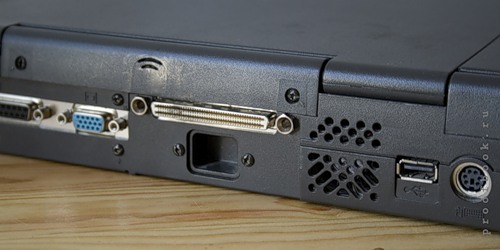
Toshiba has many models with built-in power supply, it turns out quite compact.
Toshiba Satellite T2105:
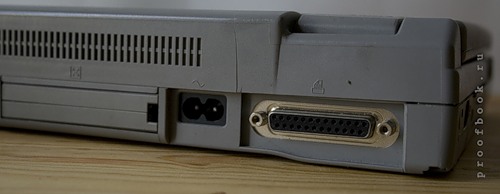
I mentioned Toshiba satellite 330 above when talking about the reset button. This is not his only "trick".
He is also a laptop box.
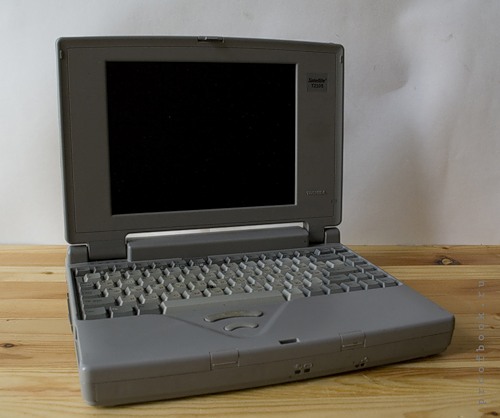
If you lift the two latches on the front end, you can open it.
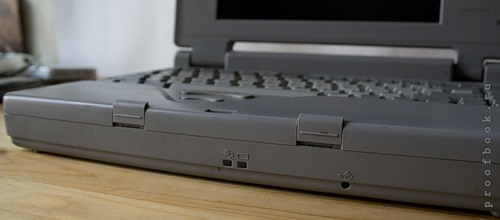
Thus, you can easily get to the battery and hard drive (though to remove the hard drive you have to unscrew another screw)
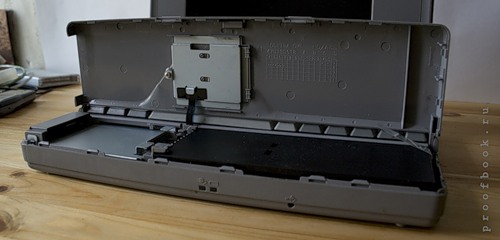
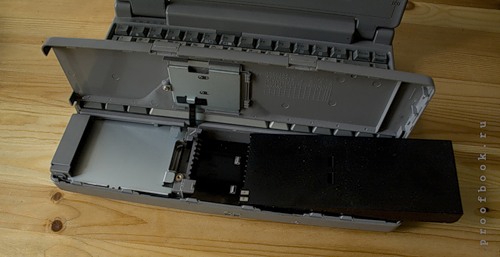
I have another laptop-box IBM thinkpad 755c

The mechanism is a bit more sophisticated.
To open the laptop (to raise the screen) there are engines from the sides. Move them halfway - the screen opens.
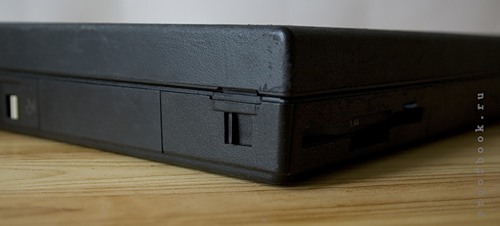
if you move them further, the entire upper part of the body rises along with the keyboard.
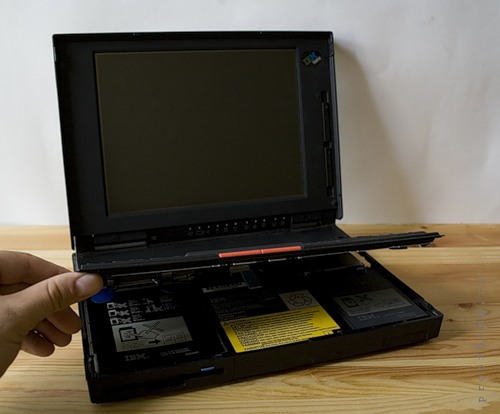
Floppy, battery and screw are available.

Leave a little on the design features.
I was always pleased with the infographics on laptops, all sorts of icons next to buttons and indicator lights, and the overall design.
For example, the inconspicuous Compaq contura 4 / 25c is utterly minimalist - a minimum of features and connectors, and the icons are beautiful and beautiful.
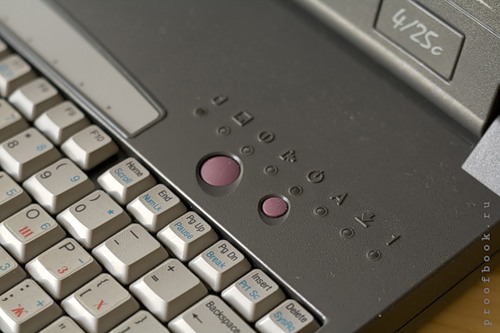
Not just buttons, but with small figured indentations.
Under the screen, the hardware brightness and contrast control sliders.

By the way, for most older laptops, the brightness (and sometimes the contrast) is hardware controlled, either the engine is made or the wheel.
And here, for example, ICL ergolite n3 / 25x (and his brother Acer)
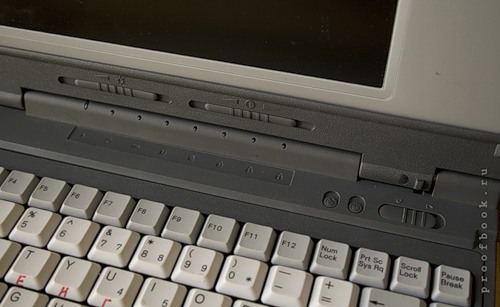
or "nameless" laptop, about which I told above
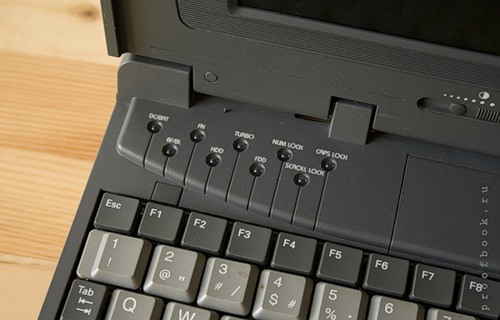
history reference:
In 1996, Acer acquired the production line of the notorious Texas Instruments. The company Texas Instruments at the time, in addition to various chips, produced a series of laptops Travel Mate and Extensa, which later went to the company Acer.
Therefore, you can find absolutely two identical laptops of one model, but one will be Acer and the other TI.
In my collection so far there are two Acer and not a single TI, but this is not the point.
One of the early Acer also pleased with the little things.
The lamp – work indicator is located in the lower right corner of the screen.
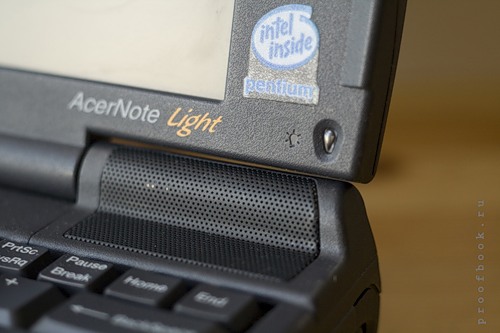
It is "through", i.e. with the lid closed, the display is also visible.
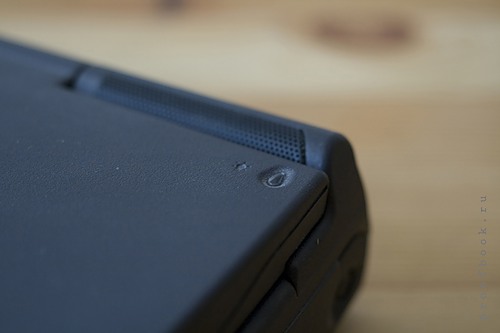
This notebook also has an interesting sidir - it opens mechanically by pressing a button, i.e. even off.
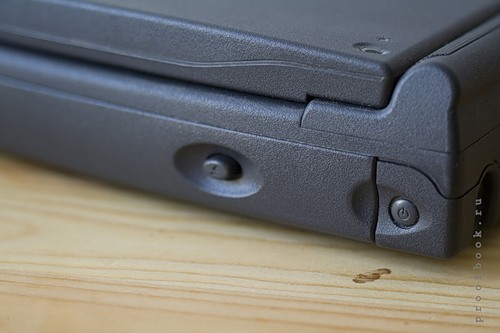
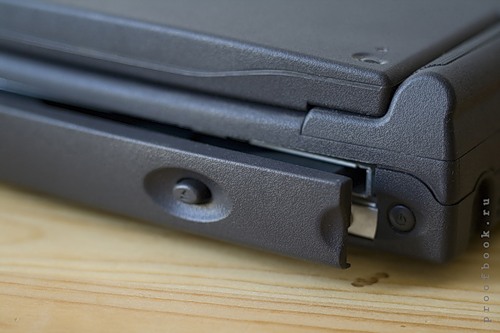
As you can see in the photo - the power button is located at the end of the laptop in the figured hole "under the finger."
For more information on laptops, additional lcd-displays were used, where information about the disks was displayed (whether the disk was inserted into the disk drive), battery charge status, caps lock, num lock, scroll lock, whether the second battery was inserted and many other functions.
Here, for example, the display of the laptop company Olivetti (exactly the one that did typewriters)
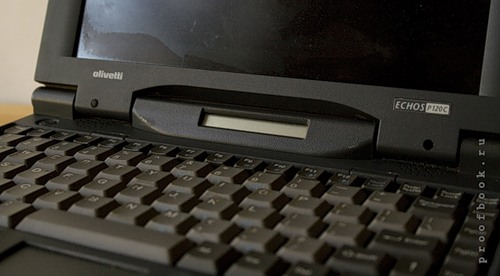
(on the spots on the matrix, pay attention, he is waiting for the screen replacement - broken, the donor has already been found).
Add. Digital display of a laptop that has sunk into the abyss

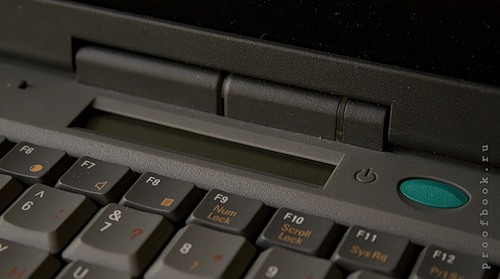
(photo of the included Digital display in one of its reviews)
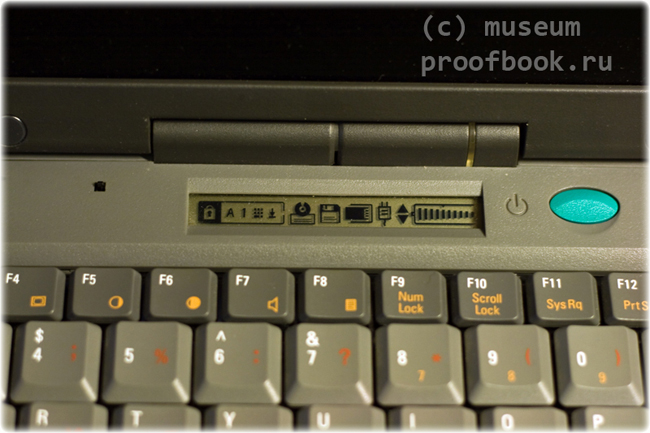
Ibm also put lcd – displays on its offspring
Ibm thinkpad 770
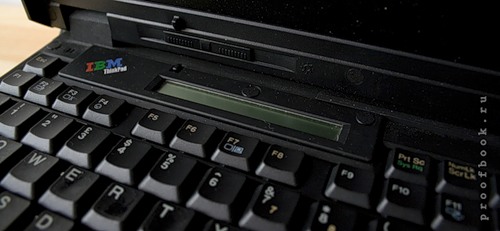
Sorry not photographed them in working condition.
AMS travel pro
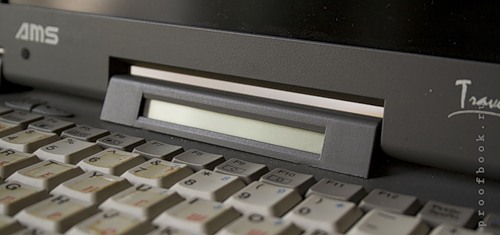
engineers loved to come up with different buttons / levers that you wouldn't even notice right away.
A good example would be the Canon Innova book 200LS: you can not find the pcmcia slot lever
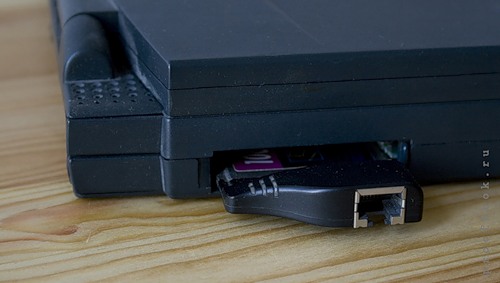
so it fits well into the case.
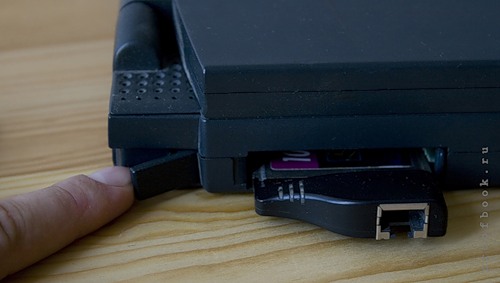
It allows you to remove inserted pcmcia – devices.
And at aplle powerbook, the device's notch is automated, next to the slot there is only a button, after pressing which the slot “spits out” the inserted card.
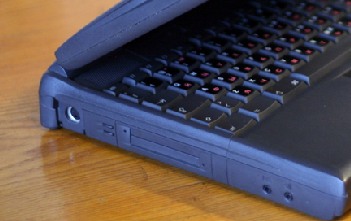
Previously, almost all the connectors in the laptop were covered with covers, plugs and plugs, I don’t know why, most likely for greater safety (the prices were second).
So these caps are interesting too:
for example, ompaq LTE 5300, everything is closed on its back end
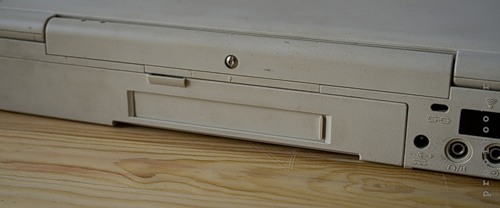
if necessary, only the docking station can be opened
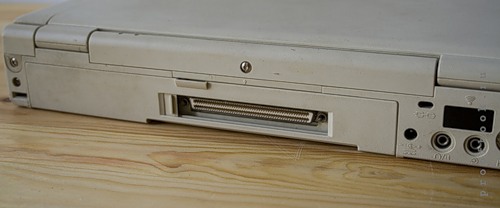
or you can have all the connectors
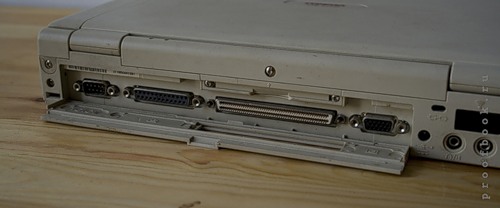
Toshiba loved to make such “multi-level” covers covering the pcmcia slots.
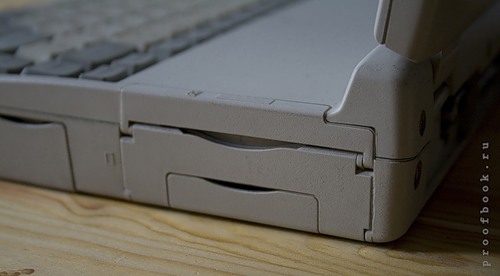
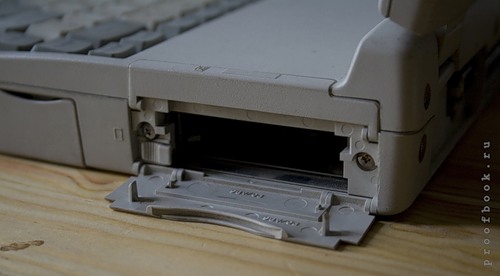
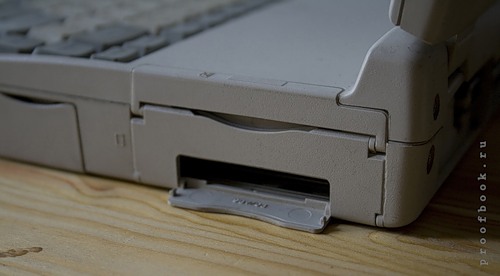
This is useful when cards with “tails” are used, inserted a card, closed the slot, and inserted a tail through a small window.
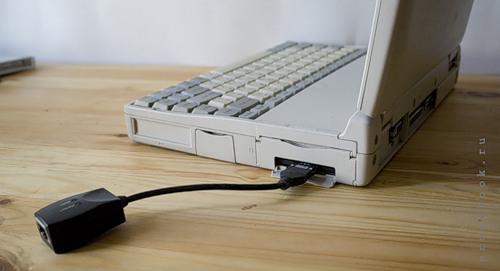
the only disadvantage of these covers is that they are brittle, they have not all survived to the present day intact.
Sometimes the windows in the covers were disposable, i.e. broke out of necessity.
All the same Toshiba firm:
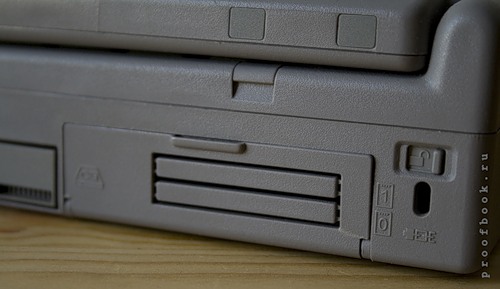
Well, perhaps the leader among the multi-window doors Toshiba Satellite 330CDT - 3 windows:
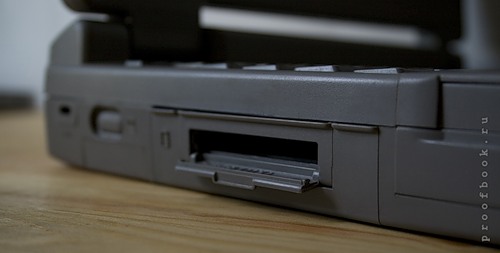
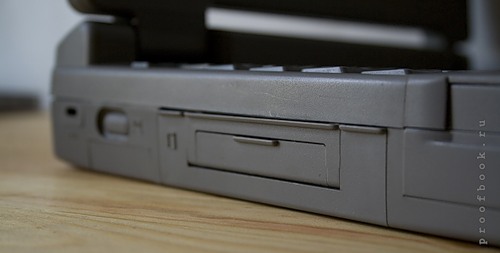
Perhaps the last, just what I will tell today - Ibm thinkpad 770
This is a monster, when I reanimate it to the end (it gives an error - it does not load) - I will write a great review.
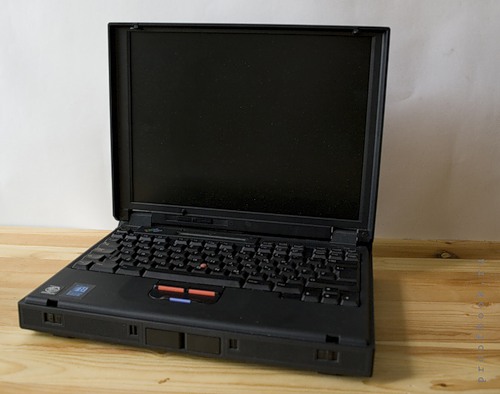
He has an interesting mechanism for pulling the drive, which can be replaced by a flop, and batteries.
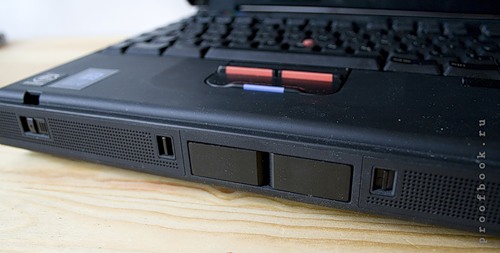
In the first step, you need to slightly move the two small levers. By the way, they also serve as an indicator, LEDs are built in - large levers will be released, with the help of which the battery and the drive are already removed
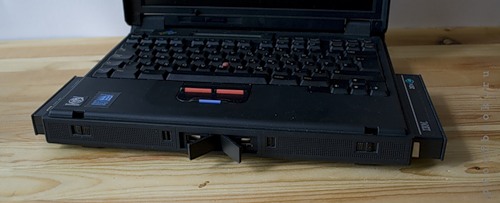
Thanks for attention. Tell us what interesting laptops you saw / used.
All laptops for which the story went - from the museum

Next, tell about food.
Nutrition
Now about the interesting power button.
For the oldest laptops, it can be a regular switch, like the Toshiba T3200

')
For others, this is the usual button, or as it used to be popular - the slider that needs to be moved. And there were also interesting.
For example, Ibm thinkpad 570 has a lock button (like on video cameras). Located on the side.

Until you click on the white file in the middle, the slider will not move.
The Toshiba satellite 330CDT has a slightly different lock: under the button there is a locker engine that blocks the button press - you will not turn it on accidentally.

At the same satellite 330CDT Toshiba modem connector is interestingly implemented, which takes up very little space.

It is necessary to open the lid with a modem icon, as it turns into an

I can not say that Toshiba came up with this design - I do not know for sure, but the same connector on the Toshiba Portege 3110CT baby. Although I saw this implementation in Sonya (they are also great in terms of laptops).
The current laptops will not find the Reset button, and the old ones still had such a function.
The Apple powerbook 3400c it is located behind the cover (something I forgot to take a picture of it).
In Ibm thinkpad 770, it is recessed into the case and is located next to the power button (you can click in pencil)

At Toshiba satellite 330 "hole" reset right on the front end of the laptop

I almost forgot to show the power button on this Toshiba: it is located under a small sliding cover.

I moved the cover - pressed the button. Again a little protection against accidental activation.

About the convenience of storing and carrying charges from the laptop, Apple has thought for a long time.
The power unit from Apple powerbook 3400c already had folding ears for winding wires.

A "clothespin" to secure the wire located directly on the connector body


But not all laptops had an external power supply. As I mentioned above, the 8.5-kilogram Toshiba T3200 power supply is integrated.
Built-in power supplies can be found in some Compaqs, such as the Compaq Armada 1700

Just stick the power cord into the laptop and work.

The younger model, Compaq Armada 1500, could also have a built-in power supply, but it could be seen to be unprofitable, or there were other reasons, and the power supply was external. Although the place is provided in the case, but instead of the connector - a plug.

Toshiba has many models with built-in power supply, it turns out quite compact.
Toshiba Satellite T2105:

Housing design
I mentioned Toshiba satellite 330 above when talking about the reset button. This is not his only "trick".
He is also a laptop box.

If you lift the two latches on the front end, you can open it.

Thus, you can easily get to the battery and hard drive (though to remove the hard drive you have to unscrew another screw)


I have another laptop-box IBM thinkpad 755c

The mechanism is a bit more sophisticated.
To open the laptop (to raise the screen) there are engines from the sides. Move them halfway - the screen opens.

if you move them further, the entire upper part of the body rises along with the keyboard.

Floppy, battery and screw are available.

Infographics
Leave a little on the design features.
I was always pleased with the infographics on laptops, all sorts of icons next to buttons and indicator lights, and the overall design.
For example, the inconspicuous Compaq contura 4 / 25c is utterly minimalist - a minimum of features and connectors, and the icons are beautiful and beautiful.

Not just buttons, but with small figured indentations.
Under the screen, the hardware brightness and contrast control sliders.

By the way, for most older laptops, the brightness (and sometimes the contrast) is hardware controlled, either the engine is made or the wheel.
And here, for example, ICL ergolite n3 / 25x (and his brother Acer)

or "nameless" laptop, about which I told above

history reference:
In 1996, Acer acquired the production line of the notorious Texas Instruments. The company Texas Instruments at the time, in addition to various chips, produced a series of laptops Travel Mate and Extensa, which later went to the company Acer.
Therefore, you can find absolutely two identical laptops of one model, but one will be Acer and the other TI.
In my collection so far there are two Acer and not a single TI, but this is not the point.
One of the early Acer also pleased with the little things.
The lamp – work indicator is located in the lower right corner of the screen.

It is "through", i.e. with the lid closed, the display is also visible.

This notebook also has an interesting sidir - it opens mechanically by pressing a button, i.e. even off.


As you can see in the photo - the power button is located at the end of the laptop in the figured hole "under the finger."
For more information on laptops, additional lcd-displays were used, where information about the disks was displayed (whether the disk was inserted into the disk drive), battery charge status, caps lock, num lock, scroll lock, whether the second battery was inserted and many other functions.
Here, for example, the display of the laptop company Olivetti (exactly the one that did typewriters)

(on the spots on the matrix, pay attention, he is waiting for the screen replacement - broken, the donor has already been found).
Add. Digital display of a laptop that has sunk into the abyss


(photo of the included Digital display in one of its reviews)

Ibm also put lcd – displays on its offspring
Ibm thinkpad 770

Sorry not photographed them in working condition.
AMS travel pro

Buttons \ levers
engineers loved to come up with different buttons / levers that you wouldn't even notice right away.
A good example would be the Canon Innova book 200LS: you can not find the pcmcia slot lever

so it fits well into the case.

It allows you to remove inserted pcmcia – devices.
And at aplle powerbook, the device's notch is automated, next to the slot there is only a button, after pressing which the slot “spits out” the inserted card.

Caps / covers
Previously, almost all the connectors in the laptop were covered with covers, plugs and plugs, I don’t know why, most likely for greater safety (the prices were second).
So these caps are interesting too:
for example, ompaq LTE 5300, everything is closed on its back end

if necessary, only the docking station can be opened

or you can have all the connectors

Toshiba loved to make such “multi-level” covers covering the pcmcia slots.



This is useful when cards with “tails” are used, inserted a card, closed the slot, and inserted a tail through a small window.

the only disadvantage of these covers is that they are brittle, they have not all survived to the present day intact.
Sometimes the windows in the covers were disposable, i.e. broke out of necessity.
All the same Toshiba firm:

Well, perhaps the leader among the multi-window doors Toshiba Satellite 330CDT - 3 windows:


Perhaps the last, just what I will tell today - Ibm thinkpad 770
This is a monster, when I reanimate it to the end (it gives an error - it does not load) - I will write a great review.

He has an interesting mechanism for pulling the drive, which can be replaced by a flop, and batteries.

In the first step, you need to slightly move the two small levers. By the way, they also serve as an indicator, LEDs are built in - large levers will be released, with the help of which the battery and the drive are already removed

Thanks for attention. Tell us what interesting laptops you saw / used.
All laptops for which the story went - from the museum
Source: https://habr.com/ru/post/102086/
All Articles